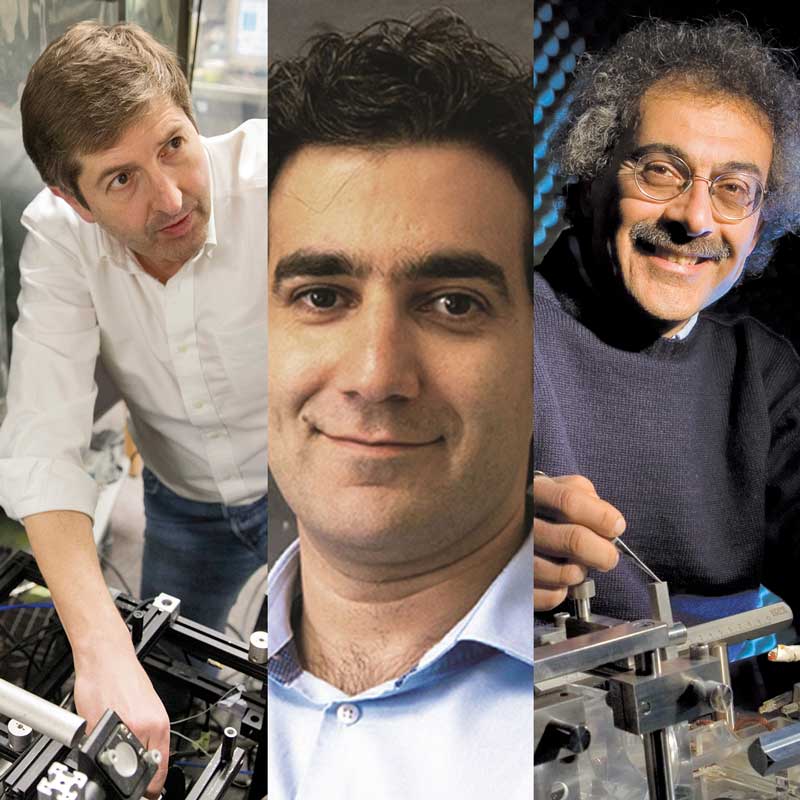Maryland Engineering Collaborates on Three MURIs
Maryland Engineering faculty are collaborators on three projects selected by the Department of Defense (DoD) for highly competitive 2022 Multidisciplinary University Research Initiative (MURI) awards. The aim of the MURI program is to leverage collective insight from multiple disciplines in order to facilitate the growth of newly emerging technologies. “By supporting teams whose members have diverse sets of expertise, the MURI program acknowledges that the complexities of modern science and engineering challenges often intersect more than one discipline and require creative and diverse approaches to tackle these problems,” said Bindu Nair, director of basic research at DoD. “This cross-fertilization of ideas can accelerate research progress to enable more rapid research and development breakthroughs and hasten the transition of basic research findings to practical application.” Winning projects with Maryland Engineering collaborators are: Maryland Engineering collaborator: Ron Walsworth, Professor and Director, Quantum Technology Center Walsworth and colleagues will help the team develop and advance minimally invasive techniques for precision testing of the structure, function, operation, and security of electronic circuits at both component and device levels. This fundamental research and related metrology will enable the assessment and quantification of next-generation microelectronics performance and security, and is being conducted in close coordination with diverse collaborators at several leading universities, as well as the Air Force Research Laboratory. Researchers in UMD’s Quantum Technology Center will contribute quantum imaging tools to this multidisciplinary effort. Maryland Engineering collaborator: Mohammad Hafezi, Minta Martin Professor, Departments of Electrical & Computer Engineering and Physics, Institute for Research in Electronics and Applied Physics, Joint Quantum Institute and the Quantum Technology Center) Hafezi will be part of a team led by Rechtsman that will use advanced fabrication technology to create tunable systems of photons, or particles of light, as well as trapped, supercooled atoms to probe exotic physical scenarios such as these. They will use them to make new connections and discoveries both within and beyond conventional physics. These connections could eventually inform new ways of manipulating large amounts of quantum information for computing or secure communication and could provide new insights for the development of new technologies for navigation. In addition to UMD and Penn State, the project team includes researchers at the University of Illinois at Urbana-Champaign, Stanford University and the California Institute of Technology. “Learning to mine a soundscape” Maryland Engineering collaborator: Shihab Shamma, Professor, Department of Electrical and Computer Engineering, The Institute for Systems Research and the Brain and Behavior Institute Lead PI: Professor Mounya Elhilali (M.S. ’03, Ph.D. ’04; advised by Shihab Shamma), Johns Hopkins University “Learning to mine a soundscape” falls within the larger “Learning from Hearing” MURI topic, and is sponsored by the Office of Naval Research. As humans, animals and machines navigate and interact with their environments, they can infer a multitude of information from the acoustic signals that they receive and integrate it with other modalities to make sense of the changing surroundings and adapt their behaviors. Acoustic signals not only convey information about sound events but also provide information about the physical structure of the environment and context. The inference of objects and events from sounds is informed by learned representations that impact action selection. This project will aim to identify the nature and role of these representations in guiding perception and behavior in humans, animals, and models. Professor Ramani Duraiswami (CS/UMIACS) is also a co-PI on the project, and in addition to UMD and JHU, the team includes colleagues from Carnegie Mellon University. Additionally, UMD Associate Professor of Physics Vladimir Manucharyan is a collaborator on a fourth MURI award, “Epitaxial phase-biased josephson junctions,” led by New York University.
Related Articles: May 17, 2022 Prev Next |


